
Washington wants Israel to secure the Egypt-Gaza border instead of launching an all-out offensive on Rafah.
Welcome back to World Brief, where we’re looking at U.S. shuttle diplomacy efforts in the Middle East, a U.N. resolution on artificial intelligence, and Portugal’s new prime minister.
U.S. Secretary of State Antony Blinken traveled to Egypt on Thursday to continue a multiday Middle East diplomatic mission centered on securing a cease-fire in Gaza. While there, he met with senior Egyptian, Saudi, Qatari, Jordanian, and Palestinian officials. Blinken is set to travel to Israel on Friday.
Among his top priorities, Blinken aims to cement an agreement that creates a six-week truce between Israel and Hamas, releases all remaining Israeli hostages in Gaza, and transports more humanitarian aid to the embattled enclave. He rejected any forced displacement of Palestinians from the region, and he warned against a large-scale military offensive on the southern Gaza city of Rafah.
The United States intends to present Israel with several alternatives to a Rafah ground offensive, including a plan to secure the Gaza-Egypt border, two U.S. officials told Politico. As part of that initiative, Israeli forces would monitor the border to curb Hamas’s ability to smuggle weapons into the city. Officials did not provide a timeline for how long Israel would intercept weapons shipments.
Israeli Prime Minister Benjamin Netanyahu insisted on Tuesday that he still plans to send Israeli troops into Rafah despite U.S. President Joe Biden warning him against it. Israel claims that around 3,000 Hamas militants are based in the city. U.S. officials expressed last week that Washington would possibly support Israel conducting smaller, more targeted military operations against high-value Hamas infrastructure there. More than half of Gaza’s 2.3 million residents are currently sheltering in Rafah.
An Israeli delegation plans to visit Washington next week to hear Biden’s concerns and discuss how to defeat Hamas “in a way that protects the civilian population, does not hinder the delivery of humanitarian assistance, and advances Israel’s overall security,” according to U.S. State Department spokesperson Matthew Miller. U.S. House Speaker Mike Johnson said on Thursday that he plans to invite Netanyahu to address Congress in the future.
The United States also submitted a draft resolution to the United Nations Security Council on Wednesday, calling for an “immediate cease-fire tied to the release of hostages,” Blinken said. The vote is likely to be held as early as this week, CNN reported, but the threat of a Russian veto remains. Washington has previously blocked U.N. resolutions calling for truces in Gaza, including an Algerian-led vote in February that urged an “immediate humanitarian cease-fire.”
Israeli security officials, meanwhile, are reportedly developing a plan for anti-Hamas Palestinians to distribute aid in Gaza. These people, backed by Arab government-funded security forces, would then assume authority of Gaza once the war concludes. Hamas denounced the plan, warning that “we will strike with an iron hand against anyone who tampers with the internal front in the Gaza Strip.”
Netanyahu has also rejected the idea because some of the Palestinians in Gaza who would be involved would be affiliated with Fatah, a Palestinian political party in the West Bank that is a rival to Hamas. The Israeli leader claims that Fatah supports terrorism and advocates for the destruction of Israel.
What We’re Following
AI regulations. The U.N. General Assembly unanimously passed its first resolution regarding artificial intelligence on Thursday. Led by the United States and co-sponsored by more than 100 governments, the text establishes a global baseline for regulating AI to protect human rights, adhere to international law, and strengthen privacy policies. Issues surrounding AI “transcended the usual geopolitical divisions that we have here in the United Nations,” a Biden administration official told FP’s Rishi Iyengar.
The resolution is nonbinding and does not have an enforcement mechanism. Yet, it adds to a slew of AI policies established in recent months that seek to reduce risks to consumers. These include an international agreement signed last November to keep AI safe from rogue actors as well as the European Union endorsing a provisional agreement for the world’s first AI rules last week.
New leadership. Portuguese President Marcelo Rebelo de Sousa invited Luís Montenegro on Thursday to form a minority government and become the nation’s new prime minister. Montenegro leads the center-right Democratic Alliance, which secured a minority in parliament after winning Lisbon’s snap parliamentary election earlier this month by a slim majority. He will be sworn in on April 2.
Montenegro said he will not establish a coalition government with the far-right Chega party and will instead seek to compromise with the long-ruling Socialist Party. “There is no internal or external reason to doubt our ability to have a stable government,” Montenegro said. For the past eight years, Socialist leadership has dominated Portuguese politics. Regional experts, however, argue that Montenegro’s win and Chega’s rise signal growing right-wing populism in Lisbon.
Stalled nominations in Accra. Ghana’s parliamentary speaker blocked the approval of new government ministers and their deputies on Wednesday to protest President Nana Akufo-Addo’s hesitance to sign an anti-LGBTQ bill into law. The bill, passed last month, would criminalize homosexual relationships and anyone who supports them once Akufo-Addo approves it. However, the Ghanaian leader asked parliament not to send him the bill until legal challenges against it are addressed.
Last month, Akufo-Addo fired then-Finance Minister Ken Ofori-Atta for his alleged failure to address the nation’s worst economic crisis in years. This sparked a major cabinet reshuffle, in which Akufo-Addo nominated 12 new ministers and deputies, some of whom are still awaiting approval. In the meantime, rights activists are pressuring Akufo-Addo to reject the anti-LGBTQ bill, as it would imprison anyone identifying as LGBTQ for up to three years and anyone promoting their activities for up to five years.
Odds and Ends
Halloween came early for U.S. and British politicians on Wednesday. Democratic Florida Rep. Jared Moskowitz sported a mask of Russian President Vladimir Putin to a House of Representatives subcommittee meeting to mock Republican efforts to condemn the business dealings of Hunter Biden, the U.S. president’s son. And in Manchester, Labour Party council member Pat Karney donned a chicken mask to urge British Prime Minister Rishi Sunak to hold general elections. No word on whether either politician received any candy for their efforts.



